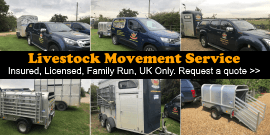Post-natal care
A healthy lamb born to a healthy ewe will need little or no help from the shepherd. However, there are a few things to be aware of – because the average mortality rate of the neo-natal lamb in the UK is 15% (but can vary between 5% and 35%).
Colostrum
The correct management of colostrum is vital for the immediate and future wellbeing of the lamb. Colostrum is the first milk produced by the ewe after lambing and it contains high levels of nutrients and antibodies. A lamb that receives inadequate colostrum is at risk of diarrhoea, pneumonia, meningitis and a disease called “watery mouth”, which is caused by E.coli bacteria.
A lamb should receive at least 10% of its bodyweight in colostrum in the first 24 hours of life, with at least half of this being taken in the first 6 hours. After this time, the gut is unable to absorb the antibodies properly.
A 60ml syringe holds about 50g colostrum; a 3kg lamb needs 150g / 180ml in the first six hours; 300g / 360ml in the first 24 hours;
Ewes have a small plug of keratin in each teat before lambing; sometimes this can be quite stubborn to remove, so express a little colostrum from each quarter to remove the plug and make sure that there is milk in both quarters.
Lambs must have colostrum within 6 hours of birth, so check each lamb before that time to check that its belly is full. If you hold the lamb up by its front legs, the belly should be like a drum.
Afterbirth
Most ewes will expel the afterbirth with no problem within a few hours after birth. Some will eat it, so you may not find it, but if you do, remove it using a shoulder length lambing glove and dispose of it by burning.
If the ewe hasn’t expelled the afterbirth, you can trim off any trailing bits but never try to pull the afterbirth away, however horrible it might look, as this can cause serious damage to the ewe. You may want to give her an antibiotic to prevent any infection.
If the ewe looks unwell, get your vet to have a look.
- Previous « Lambing
- Next Hypothermia in lambs »

About Rosemary Champion
Rosemary lives on a 12 acre smallholding in Angus, in the east of Scotland, where she keeps Ryeland Sheep, Shetland cattle and assorted poultry. She was destined to be a smallholder from an early age.
Further Reading
 Sheep Medicine Phillip R. Scott |  Sheep Health, Husbandry and Disease: A Photographic Guide Agnes C. Winter |  The Veterinary Book for Sheep Farmers David Henderson |  The Sheep Keeper's Veterinary Handbook Agnes Winter & Judith Charnley |  Beautiful Sheep: Portraits of Champion Breeds Kathryn Dun |
Smallholding shop
When you click links below and make a purchase, this may result in this site earning a commission from eBay.

50g Volostrum Lamb Colostrum single sachet
Natural alternative… from £2.80 + p&p
















